Organisational Behaviour: Culture, Politics, Power, Motivation
VerifiedAdded on 2023/06/07
|16
|5240
|340
Report
AI Summary
This report provides an in-depth analysis of organisational behaviour, focusing on how culture, politics, and power dynamics influence individual and team behaviour and performance. It explores different organisational cultures, including power, task, role, and person cultures, and their impact on employee conduct. The report also examines the role of politics within organisations, outlining various political styles and their effects. Furthermore, it evaluates content and process theories of motivation, such as Maslow's hierarchy of needs and Vroom's expectancy theory, and their application in achieving organisational goals. The analysis includes an assessment of how these factors relate to team effectiveness and overall business performance, offering recommendations for improvement. The report uses Marks & Spencer as a case study, applying the concepts to a real-world business context.
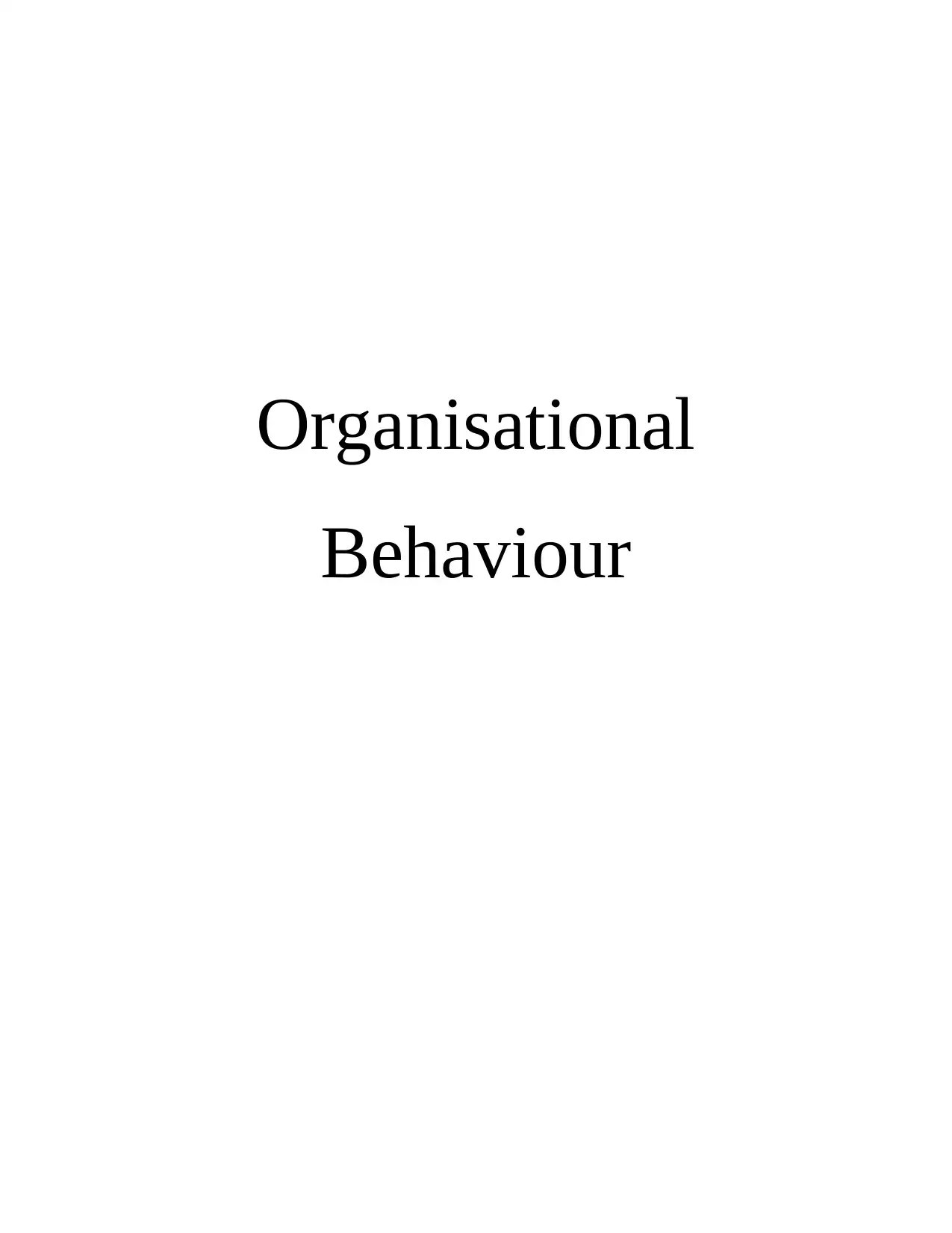
Organisational
Behaviour
Behaviour
Paraphrase This Document
Need a fresh take? Get an instant paraphrase of this document with our AI Paraphraser
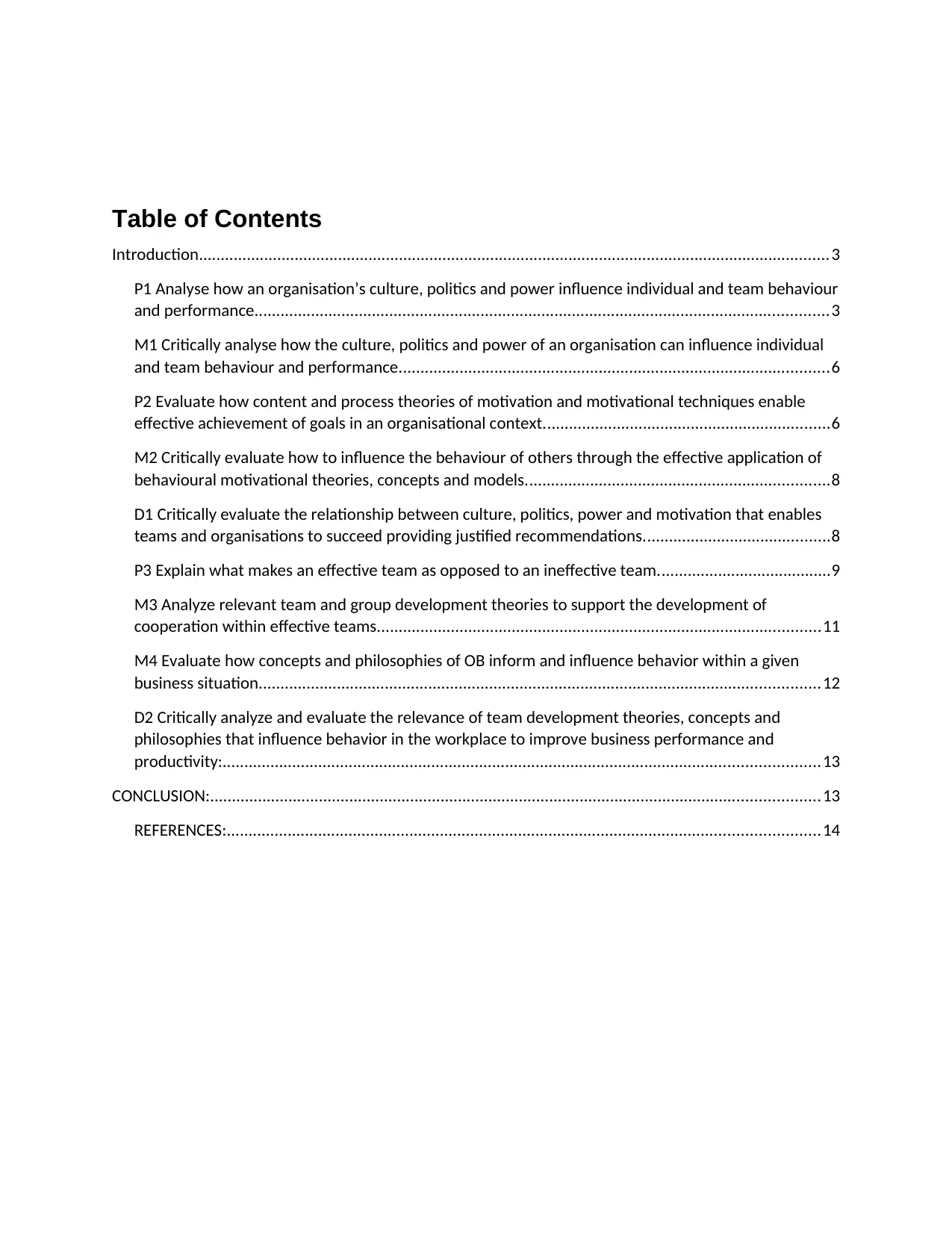
Table of Contents
Introduction.................................................................................................................................................3
P1 Analyse how an organisation’s culture, politics and power influence individual and team behaviour
and performance....................................................................................................................................3
M1 Critically analyse how the culture, politics and power of an organisation can influence individual
and team behaviour and performance...................................................................................................6
P2 Evaluate how content and process theories of motivation and motivational techniques enable
effective achievement of goals in an organisational context..................................................................6
M2 Critically evaluate how to influence the behaviour of others through the effective application of
behavioural motivational theories, concepts and models......................................................................8
D1 Critically evaluate the relationship between culture, politics, power and motivation that enables
teams and organisations to succeed providing justified recommendations...........................................8
P3 Explain what makes an effective team as opposed to an ineffective team........................................9
M3 Analyze relevant team and group development theories to support the development of
cooperation within effective teams......................................................................................................11
M4 Evaluate how concepts and philosophies of OB inform and influence behavior within a given
business situation.................................................................................................................................12
D2 Critically analyze and evaluate the relevance of team development theories, concepts and
philosophies that influence behavior in the workplace to improve business performance and
productivity:.........................................................................................................................................13
CONCLUSION:............................................................................................................................................13
REFERENCES:........................................................................................................................................14
Introduction.................................................................................................................................................3
P1 Analyse how an organisation’s culture, politics and power influence individual and team behaviour
and performance....................................................................................................................................3
M1 Critically analyse how the culture, politics and power of an organisation can influence individual
and team behaviour and performance...................................................................................................6
P2 Evaluate how content and process theories of motivation and motivational techniques enable
effective achievement of goals in an organisational context..................................................................6
M2 Critically evaluate how to influence the behaviour of others through the effective application of
behavioural motivational theories, concepts and models......................................................................8
D1 Critically evaluate the relationship between culture, politics, power and motivation that enables
teams and organisations to succeed providing justified recommendations...........................................8
P3 Explain what makes an effective team as opposed to an ineffective team........................................9
M3 Analyze relevant team and group development theories to support the development of
cooperation within effective teams......................................................................................................11
M4 Evaluate how concepts and philosophies of OB inform and influence behavior within a given
business situation.................................................................................................................................12
D2 Critically analyze and evaluate the relevance of team development theories, concepts and
philosophies that influence behavior in the workplace to improve business performance and
productivity:.........................................................................................................................................13
CONCLUSION:............................................................................................................................................13
REFERENCES:........................................................................................................................................14
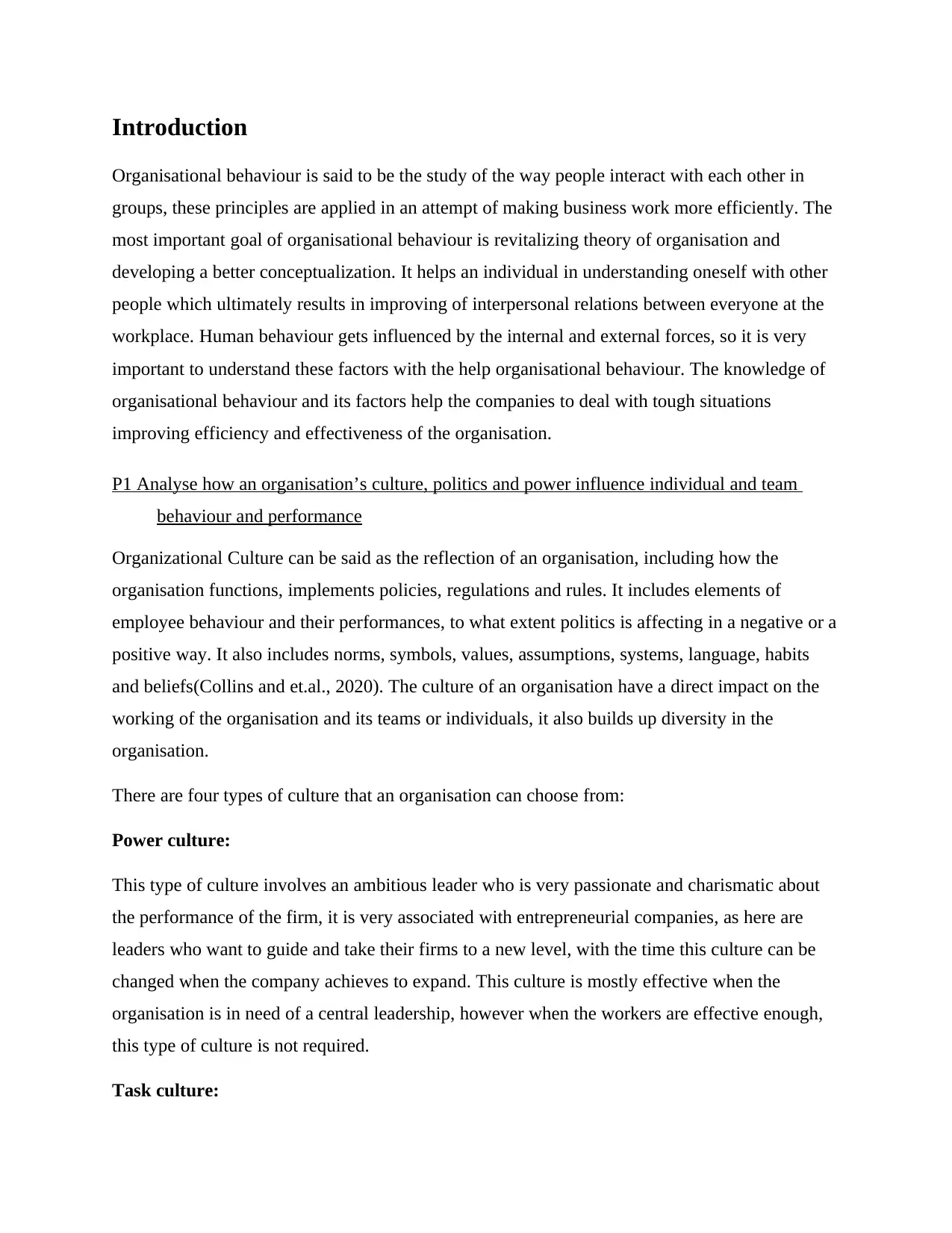
Introduction
Organisational behaviour is said to be the study of the way people interact with each other in
groups, these principles are applied in an attempt of making business work more efficiently. The
most important goal of organisational behaviour is revitalizing theory of organisation and
developing a better conceptualization. It helps an individual in understanding oneself with other
people which ultimately results in improving of interpersonal relations between everyone at the
workplace. Human behaviour gets influenced by the internal and external forces, so it is very
important to understand these factors with the help organisational behaviour. The knowledge of
organisational behaviour and its factors help the companies to deal with tough situations
improving efficiency and effectiveness of the organisation.
P1 Analyse how an organisation’s culture, politics and power influence individual and team
behaviour and performance
Organizational Culture can be said as the reflection of an organisation, including how the
organisation functions, implements policies, regulations and rules. It includes elements of
employee behaviour and their performances, to what extent politics is affecting in a negative or a
positive way. It also includes norms, symbols, values, assumptions, systems, language, habits
and beliefs(Collins and et.al., 2020). The culture of an organisation have a direct impact on the
working of the organisation and its teams or individuals, it also builds up diversity in the
organisation.
There are four types of culture that an organisation can choose from:
Power culture:
This type of culture involves an ambitious leader who is very passionate and charismatic about
the performance of the firm, it is very associated with entrepreneurial companies, as here are
leaders who want to guide and take their firms to a new level, with the time this culture can be
changed when the company achieves to expand. This culture is mostly effective when the
organisation is in need of a central leadership, however when the workers are effective enough,
this type of culture is not required.
Task culture:
Organisational behaviour is said to be the study of the way people interact with each other in
groups, these principles are applied in an attempt of making business work more efficiently. The
most important goal of organisational behaviour is revitalizing theory of organisation and
developing a better conceptualization. It helps an individual in understanding oneself with other
people which ultimately results in improving of interpersonal relations between everyone at the
workplace. Human behaviour gets influenced by the internal and external forces, so it is very
important to understand these factors with the help organisational behaviour. The knowledge of
organisational behaviour and its factors help the companies to deal with tough situations
improving efficiency and effectiveness of the organisation.
P1 Analyse how an organisation’s culture, politics and power influence individual and team
behaviour and performance
Organizational Culture can be said as the reflection of an organisation, including how the
organisation functions, implements policies, regulations and rules. It includes elements of
employee behaviour and their performances, to what extent politics is affecting in a negative or a
positive way. It also includes norms, symbols, values, assumptions, systems, language, habits
and beliefs(Collins and et.al., 2020). The culture of an organisation have a direct impact on the
working of the organisation and its teams or individuals, it also builds up diversity in the
organisation.
There are four types of culture that an organisation can choose from:
Power culture:
This type of culture involves an ambitious leader who is very passionate and charismatic about
the performance of the firm, it is very associated with entrepreneurial companies, as here are
leaders who want to guide and take their firms to a new level, with the time this culture can be
changed when the company achieves to expand. This culture is mostly effective when the
organisation is in need of a central leadership, however when the workers are effective enough,
this type of culture is not required.
Task culture:
⊘ This is a preview!⊘
Do you want full access?
Subscribe today to unlock all pages.

Trusted by 1+ million students worldwide
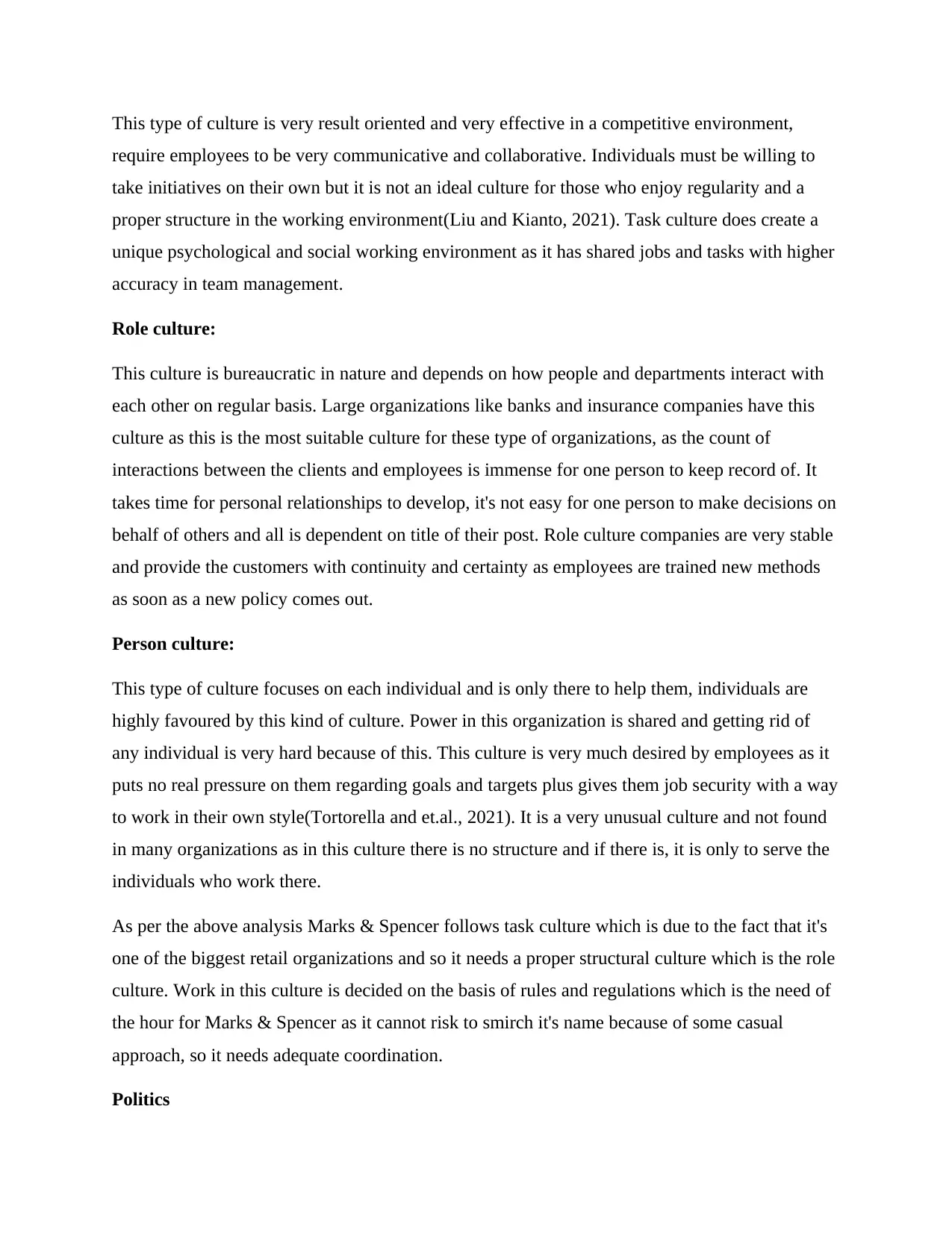
This type of culture is very result oriented and very effective in a competitive environment,
require employees to be very communicative and collaborative. Individuals must be willing to
take initiatives on their own but it is not an ideal culture for those who enjoy regularity and a
proper structure in the working environment(Liu and Kianto, 2021). Task culture does create a
unique psychological and social working environment as it has shared jobs and tasks with higher
accuracy in team management.
Role culture:
This culture is bureaucratic in nature and depends on how people and departments interact with
each other on regular basis. Large organizations like banks and insurance companies have this
culture as this is the most suitable culture for these type of organizations, as the count of
interactions between the clients and employees is immense for one person to keep record of. It
takes time for personal relationships to develop, it's not easy for one person to make decisions on
behalf of others and all is dependent on title of their post. Role culture companies are very stable
and provide the customers with continuity and certainty as employees are trained new methods
as soon as a new policy comes out.
Person culture:
This type of culture focuses on each individual and is only there to help them, individuals are
highly favoured by this kind of culture. Power in this organization is shared and getting rid of
any individual is very hard because of this. This culture is very much desired by employees as it
puts no real pressure on them regarding goals and targets plus gives them job security with a way
to work in their own style(Tortorella and et.al., 2021). It is a very unusual culture and not found
in many organizations as in this culture there is no structure and if there is, it is only to serve the
individuals who work there.
As per the above analysis Marks & Spencer follows task culture which is due to the fact that it's
one of the biggest retail organizations and so it needs a proper structural culture which is the role
culture. Work in this culture is decided on the basis of rules and regulations which is the need of
the hour for Marks & Spencer as it cannot risk to smirch it's name because of some casual
approach, so it needs adequate coordination.
Politics
require employees to be very communicative and collaborative. Individuals must be willing to
take initiatives on their own but it is not an ideal culture for those who enjoy regularity and a
proper structure in the working environment(Liu and Kianto, 2021). Task culture does create a
unique psychological and social working environment as it has shared jobs and tasks with higher
accuracy in team management.
Role culture:
This culture is bureaucratic in nature and depends on how people and departments interact with
each other on regular basis. Large organizations like banks and insurance companies have this
culture as this is the most suitable culture for these type of organizations, as the count of
interactions between the clients and employees is immense for one person to keep record of. It
takes time for personal relationships to develop, it's not easy for one person to make decisions on
behalf of others and all is dependent on title of their post. Role culture companies are very stable
and provide the customers with continuity and certainty as employees are trained new methods
as soon as a new policy comes out.
Person culture:
This type of culture focuses on each individual and is only there to help them, individuals are
highly favoured by this kind of culture. Power in this organization is shared and getting rid of
any individual is very hard because of this. This culture is very much desired by employees as it
puts no real pressure on them regarding goals and targets plus gives them job security with a way
to work in their own style(Tortorella and et.al., 2021). It is a very unusual culture and not found
in many organizations as in this culture there is no structure and if there is, it is only to serve the
individuals who work there.
As per the above analysis Marks & Spencer follows task culture which is due to the fact that it's
one of the biggest retail organizations and so it needs a proper structural culture which is the role
culture. Work in this culture is decided on the basis of rules and regulations which is the need of
the hour for Marks & Spencer as it cannot risk to smirch it's name because of some casual
approach, so it needs adequate coordination.
Politics
Paraphrase This Document
Need a fresh take? Get an instant paraphrase of this document with our AI Paraphraser
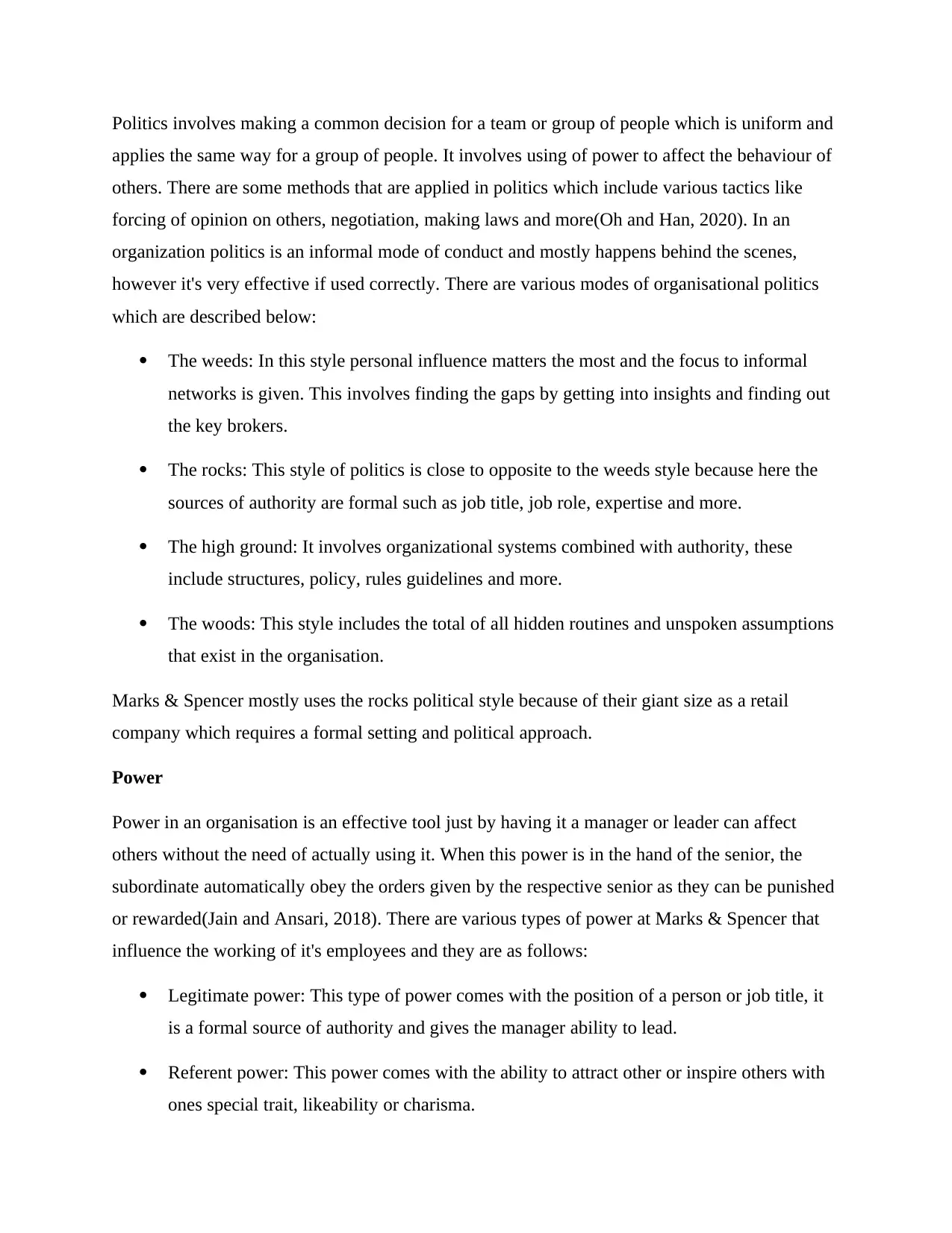
Politics involves making a common decision for a team or group of people which is uniform and
applies the same way for a group of people. It involves using of power to affect the behaviour of
others. There are some methods that are applied in politics which include various tactics like
forcing of opinion on others, negotiation, making laws and more(Oh and Han, 2020). In an
organization politics is an informal mode of conduct and mostly happens behind the scenes,
however it's very effective if used correctly. There are various modes of organisational politics
which are described below:
The weeds: In this style personal influence matters the most and the focus to informal
networks is given. This involves finding the gaps by getting into insights and finding out
the key brokers.
The rocks: This style of politics is close to opposite to the weeds style because here the
sources of authority are formal such as job title, job role, expertise and more.
The high ground: It involves organizational systems combined with authority, these
include structures, policy, rules guidelines and more.
The woods: This style includes the total of all hidden routines and unspoken assumptions
that exist in the organisation.
Marks & Spencer mostly uses the rocks political style because of their giant size as a retail
company which requires a formal setting and political approach.
Power
Power in an organisation is an effective tool just by having it a manager or leader can affect
others without the need of actually using it. When this power is in the hand of the senior, the
subordinate automatically obey the orders given by the respective senior as they can be punished
or rewarded(Jain and Ansari, 2018). There are various types of power at Marks & Spencer that
influence the working of it's employees and they are as follows:
Legitimate power: This type of power comes with the position of a person or job title, it
is a formal source of authority and gives the manager ability to lead.
Referent power: This power comes with the ability to attract other or inspire others with
ones special trait, likeability or charisma.
applies the same way for a group of people. It involves using of power to affect the behaviour of
others. There are some methods that are applied in politics which include various tactics like
forcing of opinion on others, negotiation, making laws and more(Oh and Han, 2020). In an
organization politics is an informal mode of conduct and mostly happens behind the scenes,
however it's very effective if used correctly. There are various modes of organisational politics
which are described below:
The weeds: In this style personal influence matters the most and the focus to informal
networks is given. This involves finding the gaps by getting into insights and finding out
the key brokers.
The rocks: This style of politics is close to opposite to the weeds style because here the
sources of authority are formal such as job title, job role, expertise and more.
The high ground: It involves organizational systems combined with authority, these
include structures, policy, rules guidelines and more.
The woods: This style includes the total of all hidden routines and unspoken assumptions
that exist in the organisation.
Marks & Spencer mostly uses the rocks political style because of their giant size as a retail
company which requires a formal setting and political approach.
Power
Power in an organisation is an effective tool just by having it a manager or leader can affect
others without the need of actually using it. When this power is in the hand of the senior, the
subordinate automatically obey the orders given by the respective senior as they can be punished
or rewarded(Jain and Ansari, 2018). There are various types of power at Marks & Spencer that
influence the working of it's employees and they are as follows:
Legitimate power: This type of power comes with the position of a person or job title, it
is a formal source of authority and gives the manager ability to lead.
Referent power: This power comes with the ability to attract other or inspire others with
ones special trait, likeability or charisma.
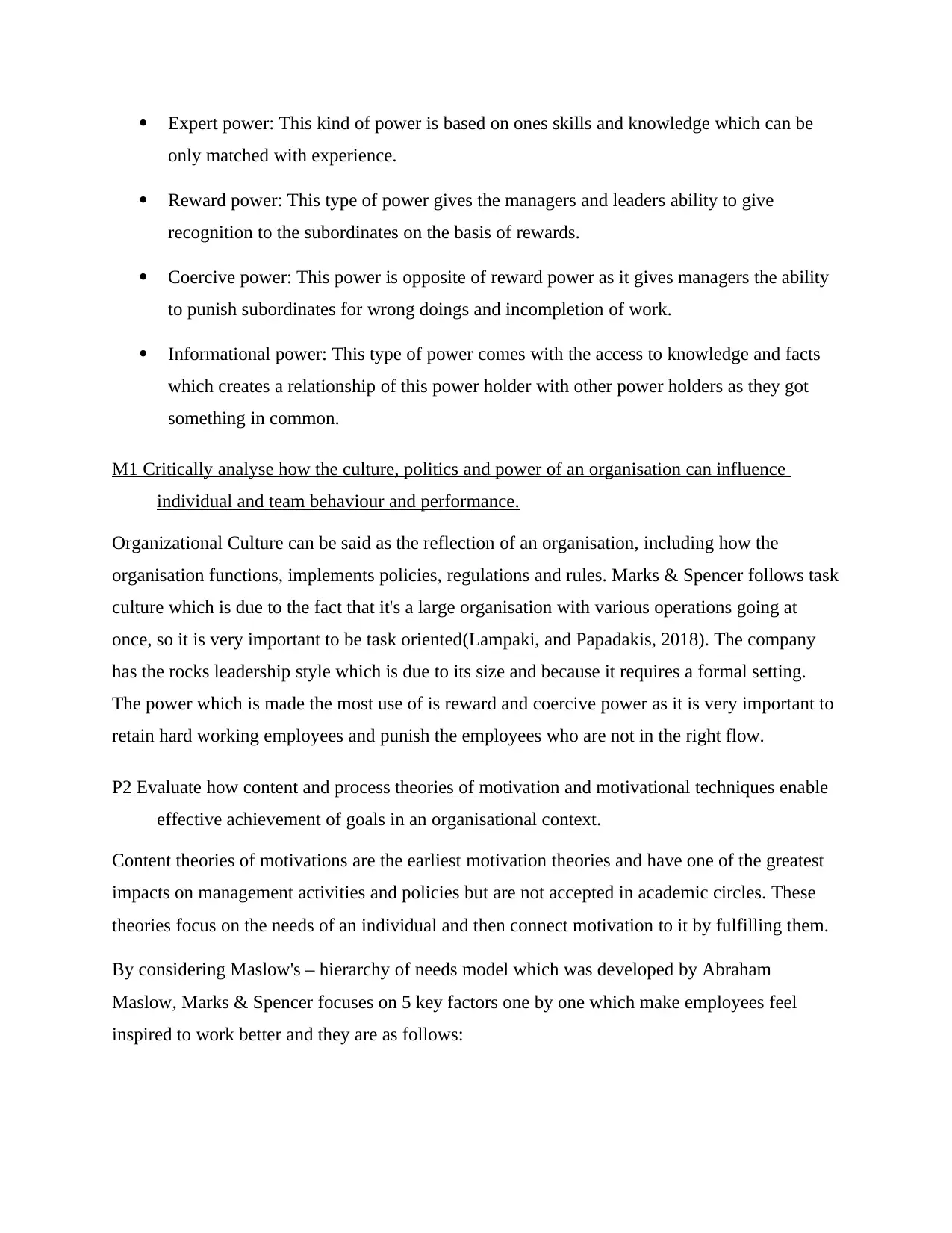
Expert power: This kind of power is based on ones skills and knowledge which can be
only matched with experience.
Reward power: This type of power gives the managers and leaders ability to give
recognition to the subordinates on the basis of rewards.
Coercive power: This power is opposite of reward power as it gives managers the ability
to punish subordinates for wrong doings and incompletion of work.
Informational power: This type of power comes with the access to knowledge and facts
which creates a relationship of this power holder with other power holders as they got
something in common.
M1 Critically analyse how the culture, politics and power of an organisation can influence
individual and team behaviour and performance.
Organizational Culture can be said as the reflection of an organisation, including how the
organisation functions, implements policies, regulations and rules. Marks & Spencer follows task
culture which is due to the fact that it's a large organisation with various operations going at
once, so it is very important to be task oriented(Lampaki, and Papadakis, 2018). The company
has the rocks leadership style which is due to its size and because it requires a formal setting.
The power which is made the most use of is reward and coercive power as it is very important to
retain hard working employees and punish the employees who are not in the right flow.
P2 Evaluate how content and process theories of motivation and motivational techniques enable
effective achievement of goals in an organisational context.
Content theories of motivations are the earliest motivation theories and have one of the greatest
impacts on management activities and policies but are not accepted in academic circles. These
theories focus on the needs of an individual and then connect motivation to it by fulfilling them.
By considering Maslow's – hierarchy of needs model which was developed by Abraham
Maslow, Marks & Spencer focuses on 5 key factors one by one which make employees feel
inspired to work better and they are as follows:
only matched with experience.
Reward power: This type of power gives the managers and leaders ability to give
recognition to the subordinates on the basis of rewards.
Coercive power: This power is opposite of reward power as it gives managers the ability
to punish subordinates for wrong doings and incompletion of work.
Informational power: This type of power comes with the access to knowledge and facts
which creates a relationship of this power holder with other power holders as they got
something in common.
M1 Critically analyse how the culture, politics and power of an organisation can influence
individual and team behaviour and performance.
Organizational Culture can be said as the reflection of an organisation, including how the
organisation functions, implements policies, regulations and rules. Marks & Spencer follows task
culture which is due to the fact that it's a large organisation with various operations going at
once, so it is very important to be task oriented(Lampaki, and Papadakis, 2018). The company
has the rocks leadership style which is due to its size and because it requires a formal setting.
The power which is made the most use of is reward and coercive power as it is very important to
retain hard working employees and punish the employees who are not in the right flow.
P2 Evaluate how content and process theories of motivation and motivational techniques enable
effective achievement of goals in an organisational context.
Content theories of motivations are the earliest motivation theories and have one of the greatest
impacts on management activities and policies but are not accepted in academic circles. These
theories focus on the needs of an individual and then connect motivation to it by fulfilling them.
By considering Maslow's – hierarchy of needs model which was developed by Abraham
Maslow, Marks & Spencer focuses on 5 key factors one by one which make employees feel
inspired to work better and they are as follows:
⊘ This is a preview!⊘
Do you want full access?
Subscribe today to unlock all pages.

Trusted by 1+ million students worldwide
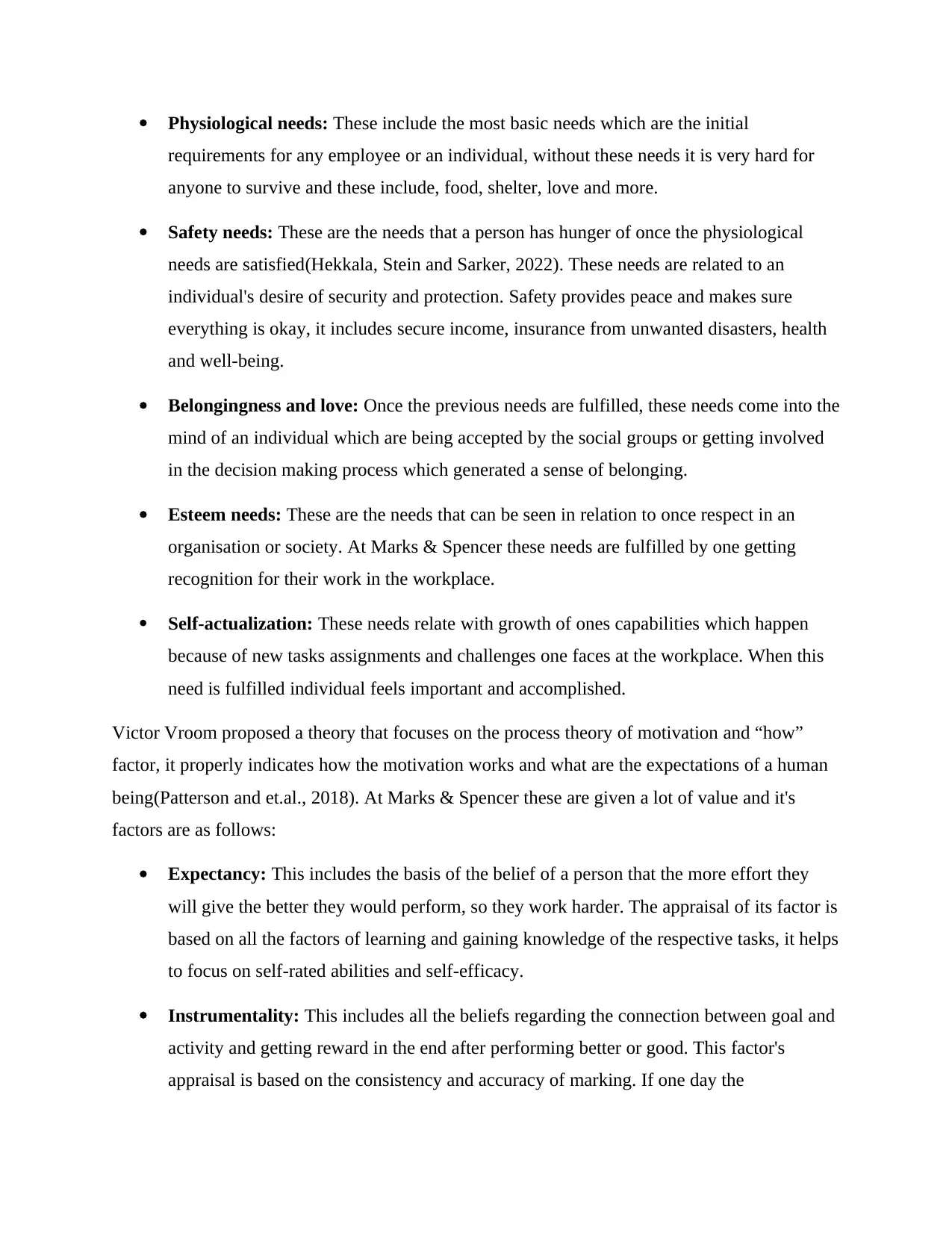
Physiological needs: These include the most basic needs which are the initial
requirements for any employee or an individual, without these needs it is very hard for
anyone to survive and these include, food, shelter, love and more.
Safety needs: These are the needs that a person has hunger of once the physiological
needs are satisfied(Hekkala, Stein and Sarker, 2022). These needs are related to an
individual's desire of security and protection. Safety provides peace and makes sure
everything is okay, it includes secure income, insurance from unwanted disasters, health
and well-being.
Belongingness and love: Once the previous needs are fulfilled, these needs come into the
mind of an individual which are being accepted by the social groups or getting involved
in the decision making process which generated a sense of belonging.
Esteem needs: These are the needs that can be seen in relation to once respect in an
organisation or society. At Marks & Spencer these needs are fulfilled by one getting
recognition for their work in the workplace.
Self-actualization: These needs relate with growth of ones capabilities which happen
because of new tasks assignments and challenges one faces at the workplace. When this
need is fulfilled individual feels important and accomplished.
Victor Vroom proposed a theory that focuses on the process theory of motivation and “how”
factor, it properly indicates how the motivation works and what are the expectations of a human
being(Patterson and et.al., 2018). At Marks & Spencer these are given a lot of value and it's
factors are as follows:
Expectancy: This includes the basis of the belief of a person that the more effort they
will give the better they would perform, so they work harder. The appraisal of its factor is
based on all the factors of learning and gaining knowledge of the respective tasks, it helps
to focus on self-rated abilities and self-efficacy.
Instrumentality: This includes all the beliefs regarding the connection between goal and
activity and getting reward in the end after performing better or good. This factor's
appraisal is based on the consistency and accuracy of marking. If one day the
requirements for any employee or an individual, without these needs it is very hard for
anyone to survive and these include, food, shelter, love and more.
Safety needs: These are the needs that a person has hunger of once the physiological
needs are satisfied(Hekkala, Stein and Sarker, 2022). These needs are related to an
individual's desire of security and protection. Safety provides peace and makes sure
everything is okay, it includes secure income, insurance from unwanted disasters, health
and well-being.
Belongingness and love: Once the previous needs are fulfilled, these needs come into the
mind of an individual which are being accepted by the social groups or getting involved
in the decision making process which generated a sense of belonging.
Esteem needs: These are the needs that can be seen in relation to once respect in an
organisation or society. At Marks & Spencer these needs are fulfilled by one getting
recognition for their work in the workplace.
Self-actualization: These needs relate with growth of ones capabilities which happen
because of new tasks assignments and challenges one faces at the workplace. When this
need is fulfilled individual feels important and accomplished.
Victor Vroom proposed a theory that focuses on the process theory of motivation and “how”
factor, it properly indicates how the motivation works and what are the expectations of a human
being(Patterson and et.al., 2018). At Marks & Spencer these are given a lot of value and it's
factors are as follows:
Expectancy: This includes the basis of the belief of a person that the more effort they
will give the better they would perform, so they work harder. The appraisal of its factor is
based on all the factors of learning and gaining knowledge of the respective tasks, it helps
to focus on self-rated abilities and self-efficacy.
Instrumentality: This includes all the beliefs regarding the connection between goal and
activity and getting reward in the end after performing better or good. This factor's
appraisal is based on the consistency and accuracy of marking. If one day the
Paraphrase This Document
Need a fresh take? Get an instant paraphrase of this document with our AI Paraphraser
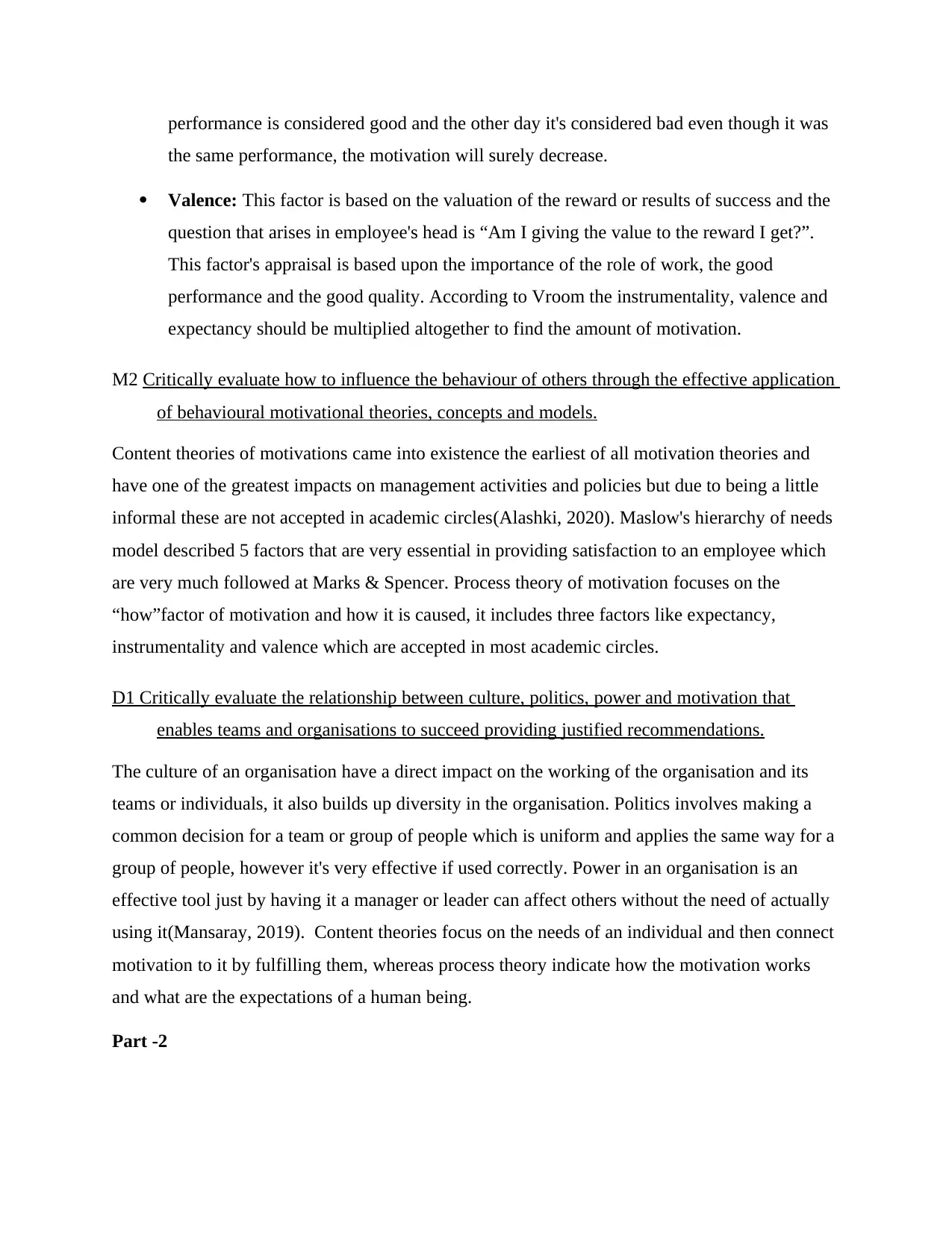
performance is considered good and the other day it's considered bad even though it was
the same performance, the motivation will surely decrease.
Valence: This factor is based on the valuation of the reward or results of success and the
question that arises in employee's head is “Am I giving the value to the reward I get?”.
This factor's appraisal is based upon the importance of the role of work, the good
performance and the good quality. According to Vroom the instrumentality, valence and
expectancy should be multiplied altogether to find the amount of motivation.
M2 Critically evaluate how to influence the behaviour of others through the effective application
of behavioural motivational theories, concepts and models.
Content theories of motivations came into existence the earliest of all motivation theories and
have one of the greatest impacts on management activities and policies but due to being a little
informal these are not accepted in academic circles(Alashki, 2020). Maslow's hierarchy of needs
model described 5 factors that are very essential in providing satisfaction to an employee which
are very much followed at Marks & Spencer. Process theory of motivation focuses on the
“how”factor of motivation and how it is caused, it includes three factors like expectancy,
instrumentality and valence which are accepted in most academic circles.
D1 Critically evaluate the relationship between culture, politics, power and motivation that
enables teams and organisations to succeed providing justified recommendations.
The culture of an organisation have a direct impact on the working of the organisation and its
teams or individuals, it also builds up diversity in the organisation. Politics involves making a
common decision for a team or group of people which is uniform and applies the same way for a
group of people, however it's very effective if used correctly. Power in an organisation is an
effective tool just by having it a manager or leader can affect others without the need of actually
using it(Mansaray, 2019). Content theories focus on the needs of an individual and then connect
motivation to it by fulfilling them, whereas process theory indicate how the motivation works
and what are the expectations of a human being.
Part -2
the same performance, the motivation will surely decrease.
Valence: This factor is based on the valuation of the reward or results of success and the
question that arises in employee's head is “Am I giving the value to the reward I get?”.
This factor's appraisal is based upon the importance of the role of work, the good
performance and the good quality. According to Vroom the instrumentality, valence and
expectancy should be multiplied altogether to find the amount of motivation.
M2 Critically evaluate how to influence the behaviour of others through the effective application
of behavioural motivational theories, concepts and models.
Content theories of motivations came into existence the earliest of all motivation theories and
have one of the greatest impacts on management activities and policies but due to being a little
informal these are not accepted in academic circles(Alashki, 2020). Maslow's hierarchy of needs
model described 5 factors that are very essential in providing satisfaction to an employee which
are very much followed at Marks & Spencer. Process theory of motivation focuses on the
“how”factor of motivation and how it is caused, it includes three factors like expectancy,
instrumentality and valence which are accepted in most academic circles.
D1 Critically evaluate the relationship between culture, politics, power and motivation that
enables teams and organisations to succeed providing justified recommendations.
The culture of an organisation have a direct impact on the working of the organisation and its
teams or individuals, it also builds up diversity in the organisation. Politics involves making a
common decision for a team or group of people which is uniform and applies the same way for a
group of people, however it's very effective if used correctly. Power in an organisation is an
effective tool just by having it a manager or leader can affect others without the need of actually
using it(Mansaray, 2019). Content theories focus on the needs of an individual and then connect
motivation to it by fulfilling them, whereas process theory indicate how the motivation works
and what are the expectations of a human being.
Part -2
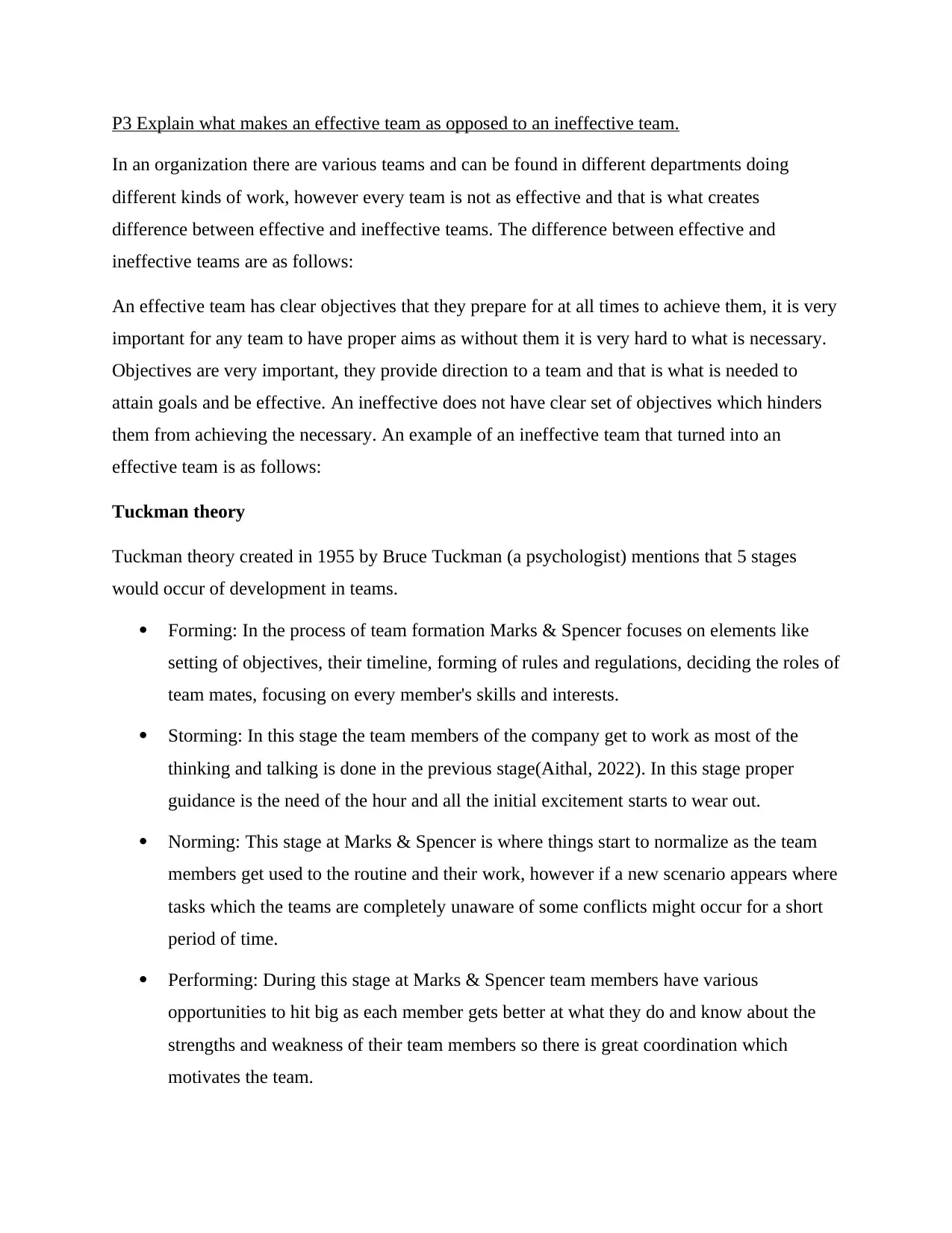
P3 Explain what makes an effective team as opposed to an ineffective team.
In an organization there are various teams and can be found in different departments doing
different kinds of work, however every team is not as effective and that is what creates
difference between effective and ineffective teams. The difference between effective and
ineffective teams are as follows:
An effective team has clear objectives that they prepare for at all times to achieve them, it is very
important for any team to have proper aims as without them it is very hard to what is necessary.
Objectives are very important, they provide direction to a team and that is what is needed to
attain goals and be effective. An ineffective does not have clear set of objectives which hinders
them from achieving the necessary. An example of an ineffective team that turned into an
effective team is as follows:
Tuckman theory
Tuckman theory created in 1955 by Bruce Tuckman (a psychologist) mentions that 5 stages
would occur of development in teams.
Forming: In the process of team formation Marks & Spencer focuses on elements like
setting of objectives, their timeline, forming of rules and regulations, deciding the roles of
team mates, focusing on every member's skills and interests.
Storming: In this stage the team members of the company get to work as most of the
thinking and talking is done in the previous stage(Aithal, 2022). In this stage proper
guidance is the need of the hour and all the initial excitement starts to wear out.
Norming: This stage at Marks & Spencer is where things start to normalize as the team
members get used to the routine and their work, however if a new scenario appears where
tasks which the teams are completely unaware of some conflicts might occur for a short
period of time.
Performing: During this stage at Marks & Spencer team members have various
opportunities to hit big as each member gets better at what they do and know about the
strengths and weakness of their team members so there is great coordination which
motivates the team.
In an organization there are various teams and can be found in different departments doing
different kinds of work, however every team is not as effective and that is what creates
difference between effective and ineffective teams. The difference between effective and
ineffective teams are as follows:
An effective team has clear objectives that they prepare for at all times to achieve them, it is very
important for any team to have proper aims as without them it is very hard to what is necessary.
Objectives are very important, they provide direction to a team and that is what is needed to
attain goals and be effective. An ineffective does not have clear set of objectives which hinders
them from achieving the necessary. An example of an ineffective team that turned into an
effective team is as follows:
Tuckman theory
Tuckman theory created in 1955 by Bruce Tuckman (a psychologist) mentions that 5 stages
would occur of development in teams.
Forming: In the process of team formation Marks & Spencer focuses on elements like
setting of objectives, their timeline, forming of rules and regulations, deciding the roles of
team mates, focusing on every member's skills and interests.
Storming: In this stage the team members of the company get to work as most of the
thinking and talking is done in the previous stage(Aithal, 2022). In this stage proper
guidance is the need of the hour and all the initial excitement starts to wear out.
Norming: This stage at Marks & Spencer is where things start to normalize as the team
members get used to the routine and their work, however if a new scenario appears where
tasks which the teams are completely unaware of some conflicts might occur for a short
period of time.
Performing: During this stage at Marks & Spencer team members have various
opportunities to hit big as each member gets better at what they do and know about the
strengths and weakness of their team members so there is great coordination which
motivates the team.
⊘ This is a preview!⊘
Do you want full access?
Subscribe today to unlock all pages.

Trusted by 1+ million students worldwide
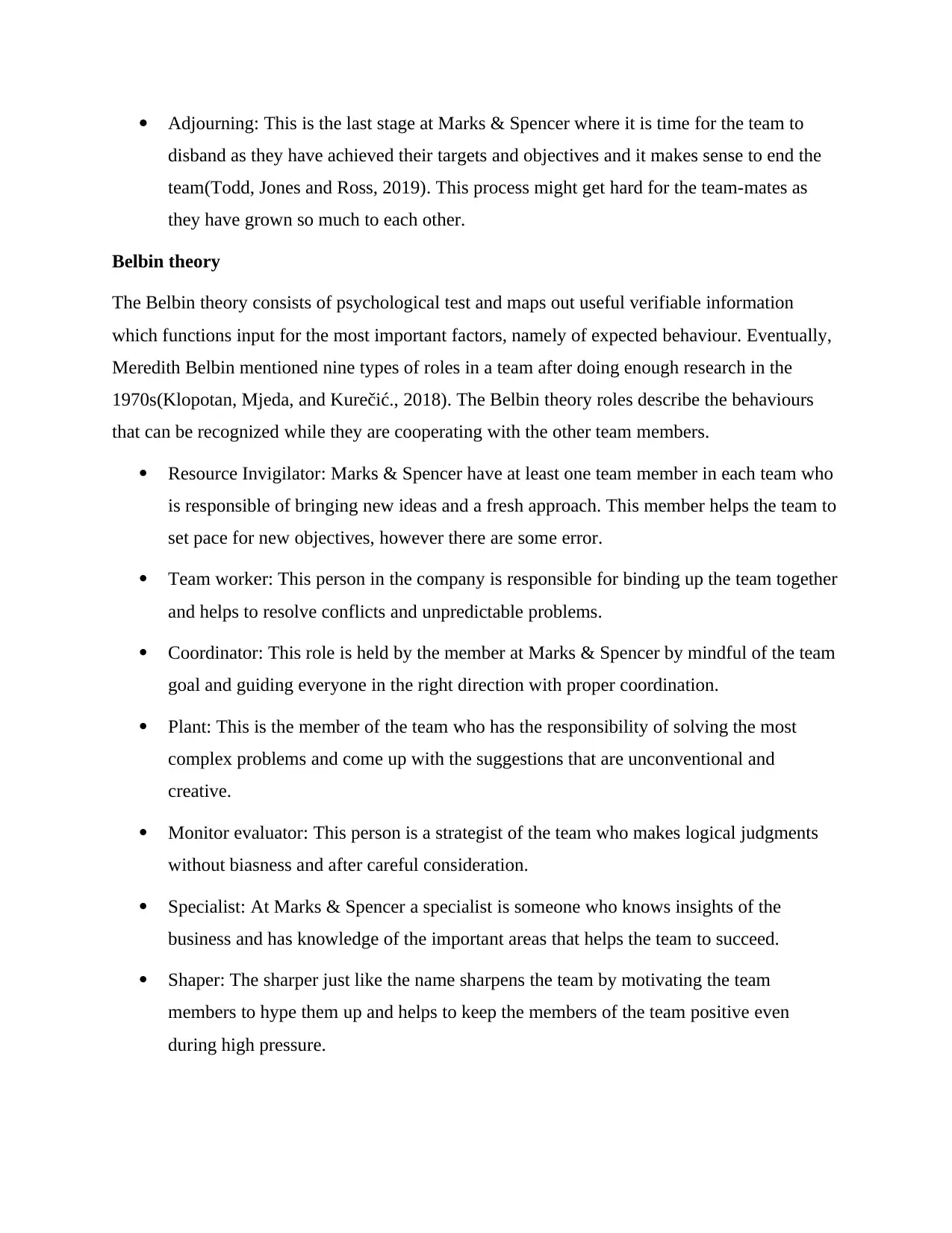
Adjourning: This is the last stage at Marks & Spencer where it is time for the team to
disband as they have achieved their targets and objectives and it makes sense to end the
team(Todd, Jones and Ross, 2019). This process might get hard for the team-mates as
they have grown so much to each other.
Belbin theory
The Belbin theory consists of psychological test and maps out useful verifiable information
which functions input for the most important factors, namely of expected behaviour. Eventually,
Meredith Belbin mentioned nine types of roles in a team after doing enough research in the
1970s(Klopotan, Mjeda, and Kurečić., 2018). The Belbin theory roles describe the behaviours
that can be recognized while they are cooperating with the other team members.
Resource Invigilator: Marks & Spencer have at least one team member in each team who
is responsible of bringing new ideas and a fresh approach. This member helps the team to
set pace for new objectives, however there are some error.
Team worker: This person in the company is responsible for binding up the team together
and helps to resolve conflicts and unpredictable problems.
Coordinator: This role is held by the member at Marks & Spencer by mindful of the team
goal and guiding everyone in the right direction with proper coordination.
Plant: This is the member of the team who has the responsibility of solving the most
complex problems and come up with the suggestions that are unconventional and
creative.
Monitor evaluator: This person is a strategist of the team who makes logical judgments
without biasness and after careful consideration.
Specialist: At Marks & Spencer a specialist is someone who knows insights of the
business and has knowledge of the important areas that helps the team to succeed.
Shaper: The sharper just like the name sharpens the team by motivating the team
members to hype them up and helps to keep the members of the team positive even
during high pressure.
disband as they have achieved their targets and objectives and it makes sense to end the
team(Todd, Jones and Ross, 2019). This process might get hard for the team-mates as
they have grown so much to each other.
Belbin theory
The Belbin theory consists of psychological test and maps out useful verifiable information
which functions input for the most important factors, namely of expected behaviour. Eventually,
Meredith Belbin mentioned nine types of roles in a team after doing enough research in the
1970s(Klopotan, Mjeda, and Kurečić., 2018). The Belbin theory roles describe the behaviours
that can be recognized while they are cooperating with the other team members.
Resource Invigilator: Marks & Spencer have at least one team member in each team who
is responsible of bringing new ideas and a fresh approach. This member helps the team to
set pace for new objectives, however there are some error.
Team worker: This person in the company is responsible for binding up the team together
and helps to resolve conflicts and unpredictable problems.
Coordinator: This role is held by the member at Marks & Spencer by mindful of the team
goal and guiding everyone in the right direction with proper coordination.
Plant: This is the member of the team who has the responsibility of solving the most
complex problems and come up with the suggestions that are unconventional and
creative.
Monitor evaluator: This person is a strategist of the team who makes logical judgments
without biasness and after careful consideration.
Specialist: At Marks & Spencer a specialist is someone who knows insights of the
business and has knowledge of the important areas that helps the team to succeed.
Shaper: The sharper just like the name sharpens the team by motivating the team
members to hype them up and helps to keep the members of the team positive even
during high pressure.
Paraphrase This Document
Need a fresh take? Get an instant paraphrase of this document with our AI Paraphraser
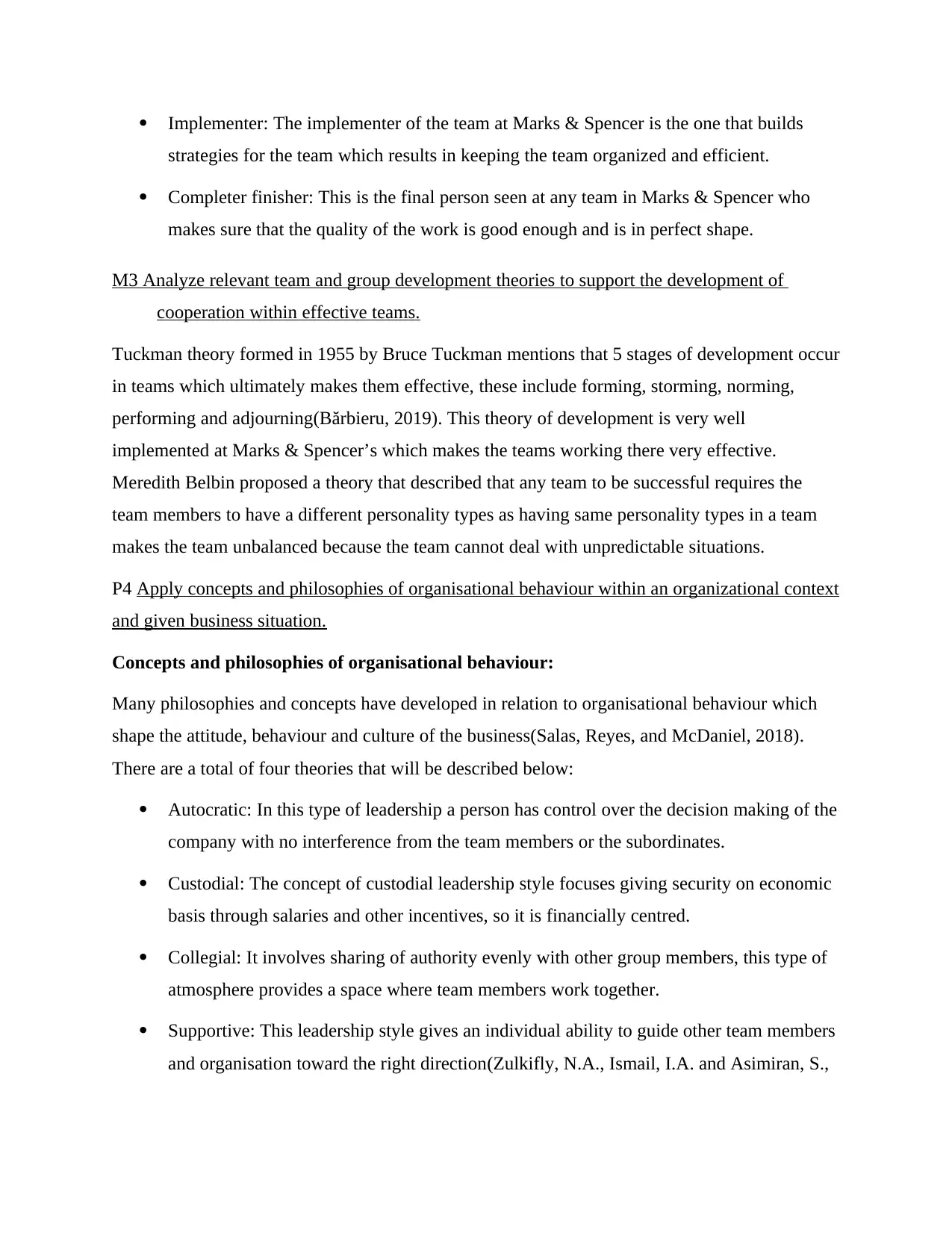
Implementer: The implementer of the team at Marks & Spencer is the one that builds
strategies for the team which results in keeping the team organized and efficient.
Completer finisher: This is the final person seen at any team in Marks & Spencer who
makes sure that the quality of the work is good enough and is in perfect shape.
M3 Analyze relevant team and group development theories to support the development of
cooperation within effective teams.
Tuckman theory formed in 1955 by Bruce Tuckman mentions that 5 stages of development occur
in teams which ultimately makes them effective, these include forming, storming, norming,
performing and adjourning(Bărbieru, 2019). This theory of development is very well
implemented at Marks & Spencer’s which makes the teams working there very effective.
Meredith Belbin proposed a theory that described that any team to be successful requires the
team members to have a different personality types as having same personality types in a team
makes the team unbalanced because the team cannot deal with unpredictable situations.
P4 Apply concepts and philosophies of organisational behaviour within an organizational context
and given business situation.
Concepts and philosophies of organisational behaviour:
Many philosophies and concepts have developed in relation to organisational behaviour which
shape the attitude, behaviour and culture of the business(Salas, Reyes, and McDaniel, 2018).
There are a total of four theories that will be described below:
Autocratic: In this type of leadership a person has control over the decision making of the
company with no interference from the team members or the subordinates.
Custodial: The concept of custodial leadership style focuses giving security on economic
basis through salaries and other incentives, so it is financially centred.
Collegial: It involves sharing of authority evenly with other group members, this type of
atmosphere provides a space where team members work together.
Supportive: This leadership style gives an individual ability to guide other team members
and organisation toward the right direction(Zulkifly, N.A., Ismail, I.A. and Asimiran, S.,
strategies for the team which results in keeping the team organized and efficient.
Completer finisher: This is the final person seen at any team in Marks & Spencer who
makes sure that the quality of the work is good enough and is in perfect shape.
M3 Analyze relevant team and group development theories to support the development of
cooperation within effective teams.
Tuckman theory formed in 1955 by Bruce Tuckman mentions that 5 stages of development occur
in teams which ultimately makes them effective, these include forming, storming, norming,
performing and adjourning(Bărbieru, 2019). This theory of development is very well
implemented at Marks & Spencer’s which makes the teams working there very effective.
Meredith Belbin proposed a theory that described that any team to be successful requires the
team members to have a different personality types as having same personality types in a team
makes the team unbalanced because the team cannot deal with unpredictable situations.
P4 Apply concepts and philosophies of organisational behaviour within an organizational context
and given business situation.
Concepts and philosophies of organisational behaviour:
Many philosophies and concepts have developed in relation to organisational behaviour which
shape the attitude, behaviour and culture of the business(Salas, Reyes, and McDaniel, 2018).
There are a total of four theories that will be described below:
Autocratic: In this type of leadership a person has control over the decision making of the
company with no interference from the team members or the subordinates.
Custodial: The concept of custodial leadership style focuses giving security on economic
basis through salaries and other incentives, so it is financially centred.
Collegial: It involves sharing of authority evenly with other group members, this type of
atmosphere provides a space where team members work together.
Supportive: This leadership style gives an individual ability to guide other team members
and organisation toward the right direction(Zulkifly, N.A., Ismail, I.A. and Asimiran, S.,
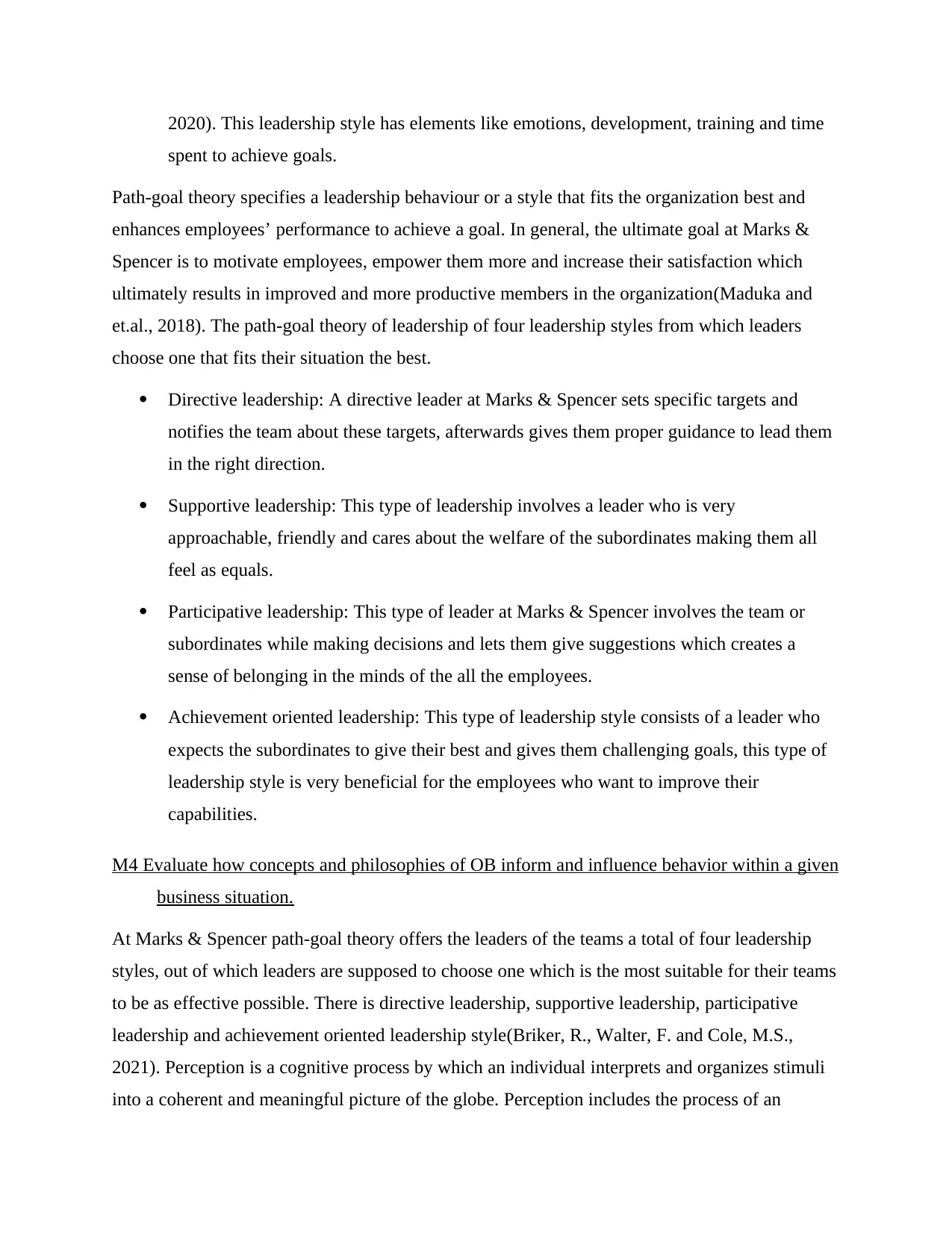
2020). This leadership style has elements like emotions, development, training and time
spent to achieve goals.
Path-goal theory specifies a leadership behaviour or a style that fits the organization best and
enhances employees’ performance to achieve a goal. In general, the ultimate goal at Marks &
Spencer is to motivate employees, empower them more and increase their satisfaction which
ultimately results in improved and more productive members in the organization(Maduka and
et.al., 2018). The path-goal theory of leadership of four leadership styles from which leaders
choose one that fits their situation the best.
Directive leadership: A directive leader at Marks & Spencer sets specific targets and
notifies the team about these targets, afterwards gives them proper guidance to lead them
in the right direction.
Supportive leadership: This type of leadership involves a leader who is very
approachable, friendly and cares about the welfare of the subordinates making them all
feel as equals.
Participative leadership: This type of leader at Marks & Spencer involves the team or
subordinates while making decisions and lets them give suggestions which creates a
sense of belonging in the minds of the all the employees.
Achievement oriented leadership: This type of leadership style consists of a leader who
expects the subordinates to give their best and gives them challenging goals, this type of
leadership style is very beneficial for the employees who want to improve their
capabilities.
M4 Evaluate how concepts and philosophies of OB inform and influence behavior within a given
business situation.
At Marks & Spencer path-goal theory offers the leaders of the teams a total of four leadership
styles, out of which leaders are supposed to choose one which is the most suitable for their teams
to be as effective possible. There is directive leadership, supportive leadership, participative
leadership and achievement oriented leadership style(Briker, R., Walter, F. and Cole, M.S.,
2021). Perception is a cognitive process by which an individual interprets and organizes stimuli
into a coherent and meaningful picture of the globe. Perception includes the process of an
spent to achieve goals.
Path-goal theory specifies a leadership behaviour or a style that fits the organization best and
enhances employees’ performance to achieve a goal. In general, the ultimate goal at Marks &
Spencer is to motivate employees, empower them more and increase their satisfaction which
ultimately results in improved and more productive members in the organization(Maduka and
et.al., 2018). The path-goal theory of leadership of four leadership styles from which leaders
choose one that fits their situation the best.
Directive leadership: A directive leader at Marks & Spencer sets specific targets and
notifies the team about these targets, afterwards gives them proper guidance to lead them
in the right direction.
Supportive leadership: This type of leadership involves a leader who is very
approachable, friendly and cares about the welfare of the subordinates making them all
feel as equals.
Participative leadership: This type of leader at Marks & Spencer involves the team or
subordinates while making decisions and lets them give suggestions which creates a
sense of belonging in the minds of the all the employees.
Achievement oriented leadership: This type of leadership style consists of a leader who
expects the subordinates to give their best and gives them challenging goals, this type of
leadership style is very beneficial for the employees who want to improve their
capabilities.
M4 Evaluate how concepts and philosophies of OB inform and influence behavior within a given
business situation.
At Marks & Spencer path-goal theory offers the leaders of the teams a total of four leadership
styles, out of which leaders are supposed to choose one which is the most suitable for their teams
to be as effective possible. There is directive leadership, supportive leadership, participative
leadership and achievement oriented leadership style(Briker, R., Walter, F. and Cole, M.S.,
2021). Perception is a cognitive process by which an individual interprets and organizes stimuli
into a coherent and meaningful picture of the globe. Perception includes the process of an
⊘ This is a preview!⊘
Do you want full access?
Subscribe today to unlock all pages.

Trusted by 1+ million students worldwide
1 out of 16
Related Documents
Your All-in-One AI-Powered Toolkit for Academic Success.
+13062052269
info@desklib.com
Available 24*7 on WhatsApp / Email
![[object Object]](/_next/static/media/star-bottom.7253800d.svg)
Unlock your academic potential
Copyright © 2020–2026 A2Z Services. All Rights Reserved. Developed and managed by ZUCOL.


